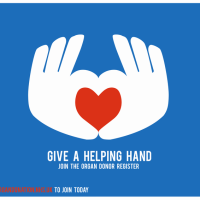Over a third of people from Black, Asian and minority ethnic (BAME) communities in the UK admit they haven’t considered organ donation or decided if they want to be an organ donor, NHS Blood and Transplant reveals.
And over a quarter of a million people who do want to donate their organs when they die say they haven’t talked to a loved one about that decision.
More people from BAME communities also know someone who has received or is in need of a transplant than their white counterparts. This is not surprising as latest statistics show that 28% of people on the waiting list for an organ transplant are from a BAME or mixed race background.
Across the whole of the UK there are 10,000 people in need of a transplant. Last year the number of people donating organs fell for the first time in 11 years. The UK also has one of the lowest rates in Europe for families consenting to organ donation and in 2014/15 only 58% agreed to donate their family members’ organs after they died and only 80 of the 1,282 deceased organ donors last year were from BAME communities.
This National Transplant Week NHS Blood and Transplant wants to get the whole nation talking about organ donation and the importance of sharing decisions on being an organ donor with family and close friends. The Seven Days to Say Yes I Donate campaign aims to help break down barriers and taboos around organ donation.
Anthony Clarkson, NHS Blood and Transplant’s Assistant Director for Organ Donation and Nursing said: “Patients from Black, Asian and some ethnic minority communities are more likely to need an organ transplant than the rest of the population as they are more susceptible to illnesses such as hypertension, diabetes and certain forms of hepatitis, all of which may result in organ failure and the need for a lifesaving transplant.
“To save more lives we need more donors from all communities. To raise that number we really need everyone to understand the importance of not being complacent. We need to get to the point where organ donation is high on the list of important personal conversations we routinely have with loved ones.”
The National Transplant Week survey found that, as a nation, we are happy to talk about many personal topics, yet we are avoiding conversations that could mean the difference between life and death for someone in need of an organ transplant:
- 7 in 10 adults have told a loved one how they would spend a lottery win
- Almost two thirds have discussed their preference for burial or cremation
- Nearly half have confided the part of their body they would most like to change
- 47% have shared destinations they dream of travelling to before they die
Even among those who want to be organ donors, there is reluctance to talk about the subject – with key reasons being discomfort around talking about death and not wanting to upset family members.
Reluctance to talk about organ donation means many healthy organs that could be donated aren’t used.
Orin Lewis OBE, Co-founder and CEO of the ACLT (African Caribbean Leukaemia Trust) said: “As a nation we’re happy sharing dreams and aspirations with one another, yet too many of us are still not making the time or are not comfortable talking about organ donation.
“Telling your loved ones you want to be an organ donor means your family will be in no doubt about your decision meaning your wishes will be fulfilled should you die in circumstances where organ donation is possible.
“Over the next seven days we’d like everyone from all communities to give a few minutes of their time to think about organ donation and talk about whether they want to be an organ donor with their relatives or a close friend.”











